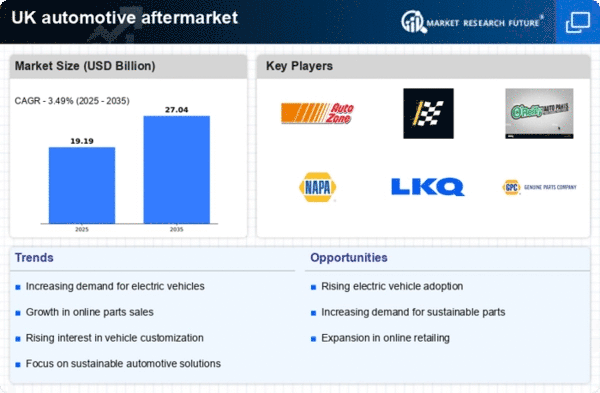Increasing Vehicle Age
The average age of vehicles on UK roads continues to rise, currently estimated at over 8 years. This trend is likely to drive demand within the automotive aftermarket market, as older vehicles typically require more maintenance and replacement parts. As vehicles age, owners may seek to enhance performance or extend the lifespan of their cars, leading to increased spending on aftermarket products and services. This situation presents opportunities for businesses to cater to a growing customer base that prioritizes vehicle longevity. Furthermore, the automotive aftermarket market is expected to benefit from the need for repairs and upgrades, as older vehicles often lack the advanced technology found in newer models. Consequently, the increasing vehicle age is a significant driver for growth in the automotive aftermarket market, as it encourages consumers to invest in quality parts and services to maintain their vehicles.
Growth of Online Retailing in Automotive Parts
The shift towards online retailing is transforming the automotive aftermarket market in the UK. E-commerce platforms are becoming increasingly popular for purchasing automotive parts and accessories, with online sales projected to account for over 30% of total aftermarket sales by 2026. This trend is driven by the convenience of online shopping, competitive pricing, and the ability to compare products easily. As consumers become more comfortable with digital transactions, businesses that adapt to this change may find new opportunities for growth. The automotive aftermarket market is likely to see an influx of new entrants and established players enhancing their online presence to capture this growing segment. This evolution in retailing could lead to increased competition and innovation, ultimately benefiting consumers through better pricing and product availability.
Regulatory Changes and Compliance Requirements
The automotive aftermarket market is influenced by ongoing regulatory changes and compliance requirements in the UK. Stricter emissions standards and safety regulations are prompting vehicle owners to seek aftermarket solutions that meet these new criteria. As regulations evolve, businesses in the automotive aftermarket market must adapt to ensure their products comply with legal standards. This situation may create opportunities for companies that specialize in eco-friendly parts and services, as consumers increasingly prioritize compliance with environmental regulations. Additionally, the need for compliance may drive demand for specific aftermarket products, such as catalytic converters and exhaust systems. As the regulatory landscape continues to change, the automotive aftermarket market is likely to experience shifts in consumer preferences, leading to potential growth in sectors that align with these new requirements.
Technological Advancements in Automotive Parts
The automotive aftermarket market is experiencing a surge in technological advancements, particularly in the development of high-performance parts and accessories. Innovations such as advanced driver-assistance systems (ADAS) and enhanced infotainment systems are becoming more prevalent, prompting consumers to upgrade their vehicles. The market for aftermarket parts is projected to grow, with estimates suggesting an increase of around 5% annually over the next few years. As technology evolves, consumers are likely to seek out aftermarket solutions that enhance vehicle performance and safety. This trend indicates a shift towards more sophisticated products, which could lead to increased competition among suppliers in the automotive aftermarket market. Companies that invest in research and development to create cutting-edge products may find themselves at a competitive advantage, further driving growth in this sector.
Rising Consumer Awareness of Vehicle Maintenance
Consumer awareness regarding the importance of regular vehicle maintenance is on the rise in the UK. Educational campaigns and increased access to information have led to a more informed customer base that understands the benefits of maintaining their vehicles. This heightened awareness is likely to result in increased spending within the automotive aftermarket market, as consumers are more inclined to invest in quality parts and services. Reports indicate that approximately 60% of vehicle owners now prioritize regular servicing and maintenance, which directly impacts the demand for aftermarket products. As consumers become more proactive about vehicle care, businesses in the automotive aftermarket market may experience a boost in sales, particularly for maintenance-related products and services. This trend suggests a positive outlook for the market, as informed consumers are likely to contribute to sustained growth.
















